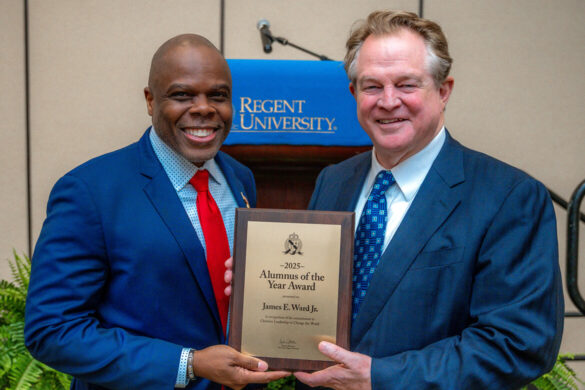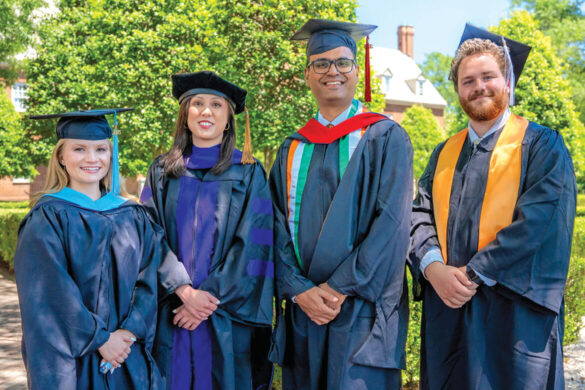Regent Named a National Center of Academic Excellence in Cyber Defense Education
Regent University continues to receive high marks for its cybersecurity degree programs. With an estimated 1.5 million jobs available in this highly competitive and important field, Regent remains dedicated to meeting the needs of a growing cybersecurity workforce.
This past fall, the National Security Agency (NSA) and the Department of Homeland Security (DHS) recognized the university as a National Center of Academic Excellence in Cyber Defense Education (CAE-CDE). The prestigious designation is awarded to regionally accredited two-year, four-year and graduate-level institutions in the U.S. committed to creating cybersecurity programs that train students to defend America’s cyberspace.
“Regent is helping build the most highly trained cyber workforce in the nation,” says Dr. M.G. “Pat” Robertson, the university’s founder, chancellor and CEO. “This certification from the NSA and the DHS is an important step toward equipping the next generation of cybersecurity professionals with the highest level of training available.”
Regent earned the CAE-CDE designation after an intensive, three-year review. Currently, only about four percent of universities in the United States are recognized with this distinguished honor.
“The program application is really extensive. It’s quite rigorous. You have to have a mature program,” explains Cheryl Beauchamp, professor and department chair of Engineering and Computer Science at Regent’s College of Arts & Sciences. “When we launched our cybersecurity program … we knew this designation would be a testament to what we have here at Regent.”
The university received the prestigious distinction less than one year after opening its state-of-the-art cyber range, which provides practical, hands-on experience in identifying and stopping hackers and other virtual threats. This world-class facility — the first of its kind at a private university in the United States — provides cybersecurity training and simulation platforms using real-time attack scenarios and security breaches.
“Cybersecurity is an area of strategic national importance,” adds Dr. Gerson Moreno-Riaño, the university’s executive vice president for Academic Affairs. “Regent will continue to advance education and training for industry-leading professionals to equip them to serve and lead in the cyber domain as well as to protect the data of our nation’s government, infrastructure, businesses and communities.”
To Regent, this achievement reflects the university’s commitment to meeting the growing educational needs in an important and highly competitive field. Beauchamp says the U.S. government recognizes the importance of graduating students with cybersecurity skills that are urgently needed in today’s world. That’s why Regent is building degree programs aligned with key “knowledge areas.” It’s winning strategy that has drawn positive reviews from the NSA and DHS.
“There’s real value in hands-on experience,” Beauchamp insists. “Learning theory from books is one thing. But the next step, actually gaining experience via Regent’s Cyber Range, competitions and other events, will build skills and confidence. That approach is a testament to what Regent is all about.”
For information about cybersecurity training or learning a degree from Regent University, visit regent.edu/cybersecurity, email cyber@regent.edu or call 757.352.4215.











